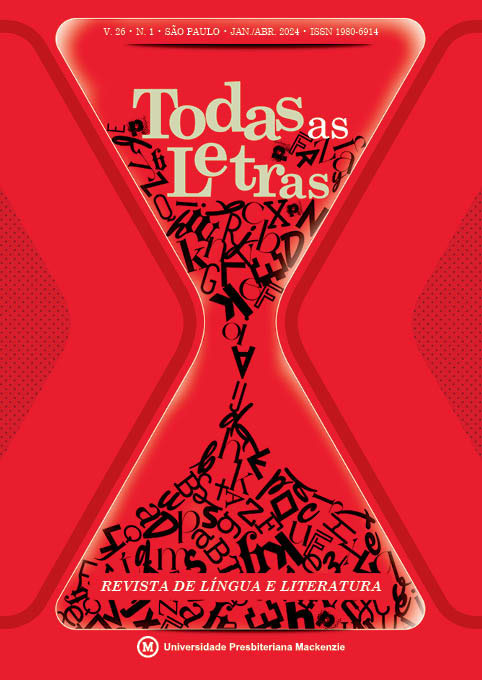Gatekeeping and the virtual literary criticismo:
the fan-readers beyond the silence reception
Keywords:
Gatekeeper, Fan-readers, Fandom. Fantasy, Literary systemAbstract
The gatekeeper concept, borrowed from the comunication theory
which study the indicidual whose decisions impact the kind of information that
will be spread, is used together with the ideia of a literary system from Antonio
Candido to observe how the readers, in special case the fan-readers of fantasy
books, take on a critic position and interfered in what is allowed or not inside
the groups of fans, the fandom.
Downloads
References
ANELLI, Melissa. Harry e seus fãs. Rio de Janeiro: Rocco, 2011.
BARTHES, Roland. S/Z. New York: Hill and Wang, 1975. [No Brasil: S/Z. Tradução de Léa Novaes. Rio de Janeiro: Nova Fronteira, 1992].
CANDIDO, Antonio. Literatura e sociedade. Rio de Janeiro: Ouro sobre azul, 2019.
CARPENTER, H. (org.) As cartas de J.R.R. Tolkien. Tradução Gabriel Oliva Brum. Curitiba: Arte e Letra, 2006.
EBERHARD, W. B. “‘News value’ treatments are far from consistent among newswriting texts”. Journalism Educator, 37 (1), 9-11, 50, 1982.
FRAADE-BLANAR, Zoe; GLAZER, Aaron M. Superfandom: Como nossas obsessões estão mudando o que compramos e quem somos. Tradução de Guilherme Kroll. Rio de Janeiro: Anfiteatro, 2018.
GALLEGO-CUIÑAS, Ana. “Las editoriales independientes en el punto de mira literario: balance y perspectivas teóricas”. Caravelle, 113, 2019. Disponível em: <http://journals.openedition.org/caravelle/6451>. Acesso em 1o fev. 2022.
GALLEGO-CUIÑAS, Ana. “El valor del objeto literario”. Ínsula, 814, 2014. GALLEGO-CUIÑAS, A.; ROMERO-FRÍAS, E. and ARROYO-MACHADO, W. "Independent publishers and social networks in the 21st century: the balance of power in the transatlantic Spanish-language book market". Online Information Review, Vol. 44 No. 7, 2020, pp. 1387-1402. Disponível em: <https://doi.org/10.1108/OIR-10-2019- 0342>. Acesso 1o fev. 2022.
HIRSCH, P. M. “Occupational, organizational and institutional models in mass media research: Toward an integrated framework”. In: HIRSCH, P. M; MILLER, P. V. & KLINE, E. G. (Eds.). Strategies for communication research. Beverly
Hills: Sage, 1977. HOHLFELDT, Antonio; MARTINO, Luiz C.; FRANÇA, Vera Veiga (Org.). Teorias da Comunicação: conceitos, escolas e tendências. Petrópolis: Vozes, 2001.
HOUGH, G. A. News writing. Boston, Houghton Mifflin, 1995.
ITULE, B. D.; ANDERSON, D. A. News writing and reporting for today’s media. Boston: McGraw-Hill, 2007.
JAMISON, Annie. Fic – Por que a fanfiction está dominando o mundo. Tradução Marcelo Barbão. Rio de Janeiro: Anfiteatro, 2017.
JENKINS, Henry. Cultura da convergência. Tradução de Susana Alexandria. São Paulo: Aleph, 2009.
JENKINS, Henry. Invasores do texto: Fãs e a cultura participativa. Tradução Érico Assis. Nova Iguaçu: Marsupial, 2015.
JENKINS, Henry; FORD, Sam; GREEN, Joshua. Cultura da conexão: criando valor e significado por meio da mídia propagável. Tradução de Patricia Arnaud. São Paulo: Aleph, 2014.
MILLS, C. W. “White ignorance”. In SULLIVAN, S. & TUANA, N. (Eds.). Race and epistemologies of ignorance. Albany: State University of New York, 2007.
NINA, Cláudia. Literatura nos jornais: A crítica literária dos rodapés às resenhas. São Paulo: Summus, 2017.
SAPIRO, G. Les Contradictions de La Globalisation Éditoriale. Paris: Nouveau Monde, 2009.
SHIRKY, Clay. Lá vem todo mundo: o poder de organizar sem organizações. Tradução de Maria Luiza X. de A. Borges. Rio de Janeiro: Zahar, 2012.
SHOEMAKER, Pamela J.; RESSE, Stephen D. Mediating the message: Theories of influences on mass media content. White Plans: Longman, 1996.
SHOEMAKER, Pamela J.; VOS, Tim P. Tradução de Vivian Nickel. Teoria do Gatekeeping: Seleção e Construção da Notícia. Porto Alegre: Penso, 2011.
Downloads
Published
How to Cite
Issue
Section
License
Copyright (c) 2024 Fernanda da Cunha Correia

This work is licensed under a Creative Commons Attribution-NonCommercial 4.0 International License.
The originals accepted and published become property of Mackenzie Presbyterian University, being forbidden their total or partial reproduction without permission of the Editorial Board, except for study and research.




